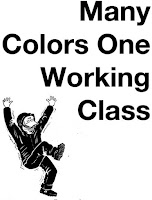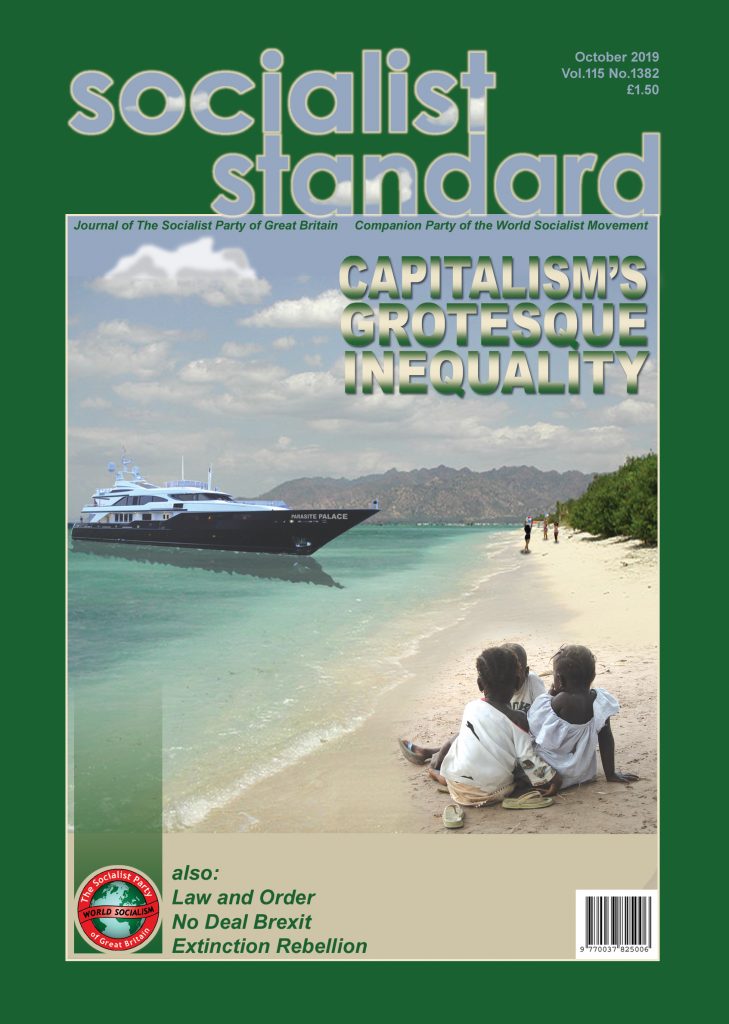
Socialism
will not come as a “gift,” from humanitarian saviours nor
“automatically” from the bitter class struggles. The ideas and
outlook of the capitalists have become deeply entrenched and is
promote the so-called “theory of human nature,” which says that
people are basically selfish and greedy and aggressive and those
traits are inborn and will never change, so socialism is bound to
fail and is a hopeless Utopia. This “theory” is garbage. There is
no such thing as “human nature.” People ask, can there be such a
thing as a secure and happy future for all, or must the rat race
continue? Is it inevitable that a small number of rich people should
cream off most of the benefits of modern industry and technology,
while the rest spend their days at heavy and often boring work,
whether in mines, factory, offices or in the home? Are things
arranged like this for always because of faults of “human nature”,
“man’s natural greed”, and the like? It is not “human nature”
that is the cause of the problems people face today. It is the way
society is organised, with a minority of people owning and
controlling the wealth, the industry of our country, and excluding
the vast majority of the people from any real say in the running of
society. This is what lies at the root of the problems that working
people face. It is this system of capitalism,
In
the slave system, it was considered “natural” for one group of
people, the slaveowners, to own other people, the slaves. In
capitalist society, this idea is regarded as absurd, because there is
no longer the need for slaves as private property. But today's system
has every need for wage-slaves. So it presents as “natural” the
kind of society where a small group, the capitalists, own the means
of production and on that basis force the great majority of society
to toil to enrich them. The slaveowners and the capitalists have one
fundamental thing in common–they are both exploiters, and they both
regard it as the correct and perfect order of things for a small
group of parasites to live off the majority of labouring people. They
differ only in the form in which they exploit and therefore in their
view of how society should be organised to ensure this exploitation.
When humanity has achieved socialism, society as a whole will
consciously reject the idea that any one group should privately own
the means of production. Then wage-slavery, based on the ownership of
capital as private property, will be seen as just absurd as chattel
slavery, based on the ownership of other people as private property.
The working class, has no interest in promoting private gain at the
expense of others and every interest in promoting cooperation. For
only in this way can it emancipate itself and all humanity.
Many
people know that life can be improved to make it better for all. The
Socialist Party believes that within the way our society is ordered
today, there are already forces growing that can change it for a
better one. This conviction comes from our study of life as it really
is, and from the lessons learnt from the experience of fighting for a
better future. It comes from the study of what life was like in the
past, how it has changed and what made it change.
Starting
from the understanding that socialism is not won by propaganda
speeches, some have come to elevate the day-to-day struggles to the
exclusion of the fight to win the battle of ideas for the minds of
our fellow-workers. Certainly, socialism will not come by converting
people to by educational lectures and party-paper propaganda. But we
do suggest that it is urgent that we break with the outlook which
sees these struggles as ends in themselves. It is necessary to resist
in every way the suffering brought upon the workers by the
introduction of automation: but it is also necessary to explain the
new perspectives opened to a socialist society by automation.
The
Socialist Party hope to participate in achieving socialism, that is,
the ownership of the means of production by the working people, the
extension of the socialised process of production into socialised
ownership. Capitalism suppresses new means of production to protect
vested interests or where profits are threatened. Working people who
have produced all the wealth around us must come into ownership and
control of what is their own by right, so that they can then build
the society and produce the things they want. The vast majority of
the people gain nothing from capitalism and would lose nothing with
its passing. Even today, although they do not own or control the
industry, they in fact are turning the wheels that keep all industry
going.
The Socialist Party is concerned more with people and change
than with anything else. Our daily experience still confirms the
truth of our way of looking at human society. Everything created and
valued by men and women, all wealth, has been produced as a result of
human labour being applied to the materials supplied by nature. Under
capitalism, a minority still controls the wealth of the nation (the
raw materials, the factories and the land) and the majority work with
machines in the factories that they do not own. As in previous
societies that are divided into classes, under capitalism, the
interests of the opposing classes cannot be reconciled. There is
class struggle between the employers on the one hand, and the workers
on the other. Class struggle, or “strife”, as some would call it,
is built into capitalist society, because it is not possible to
satisfy the capitalists’ aspirations and those of the workers at
the same time.
The workers fight for better wages and conditions, and
the capitalist lives to make the maximum profit out of the labour of
the workers. Profits can only come from the value created by the
workers. Hence the conflict. The capitalist is interested in
organising the production of those goods alone which will make him a
profit, while the worker is interested not in profit, but in being
able to buy what he wants and needs. The higher the wages paid to the
worker, the greater the threat to the capitalist’s profits.
Socialism
will enable us to overcome the brakes on progress of capitalism. It
will release the creative energies of the people. Different
conflicting classes will cease to exist, as all people make their
contribution to the productive life of society. The oppressive
functions of the state as we know them will become redundant, and
will wither away as they fall out of use. What will remain will be
only a democratic administration of production in the hands of the
people.
Mankind
will be able to develop its talents to the full. With the harnessing
of science and technology to industry, boring and repetitive work
will be eliminated. Work for all will become as it is today for only
a very small minority—interesting and satisfying. The
essential difference between town and country will be ended, as
housing, travel and cultural facilities become available to all
people. The boundaries between mental and physical labour will be
removed as all people receive the freedom and means by which to
exercise their potential, their talents and abilities.
But
things do not stop there. There will never be a time when mankind has
solved all problems and then sits down to live like a cabbage. What
happens is that the problems change. They become more worthy of our
time and attention. Life for all will be plentiful, secure, happy
and interesting.
The
building of this new society is the aim of the
Socialist Party.




















